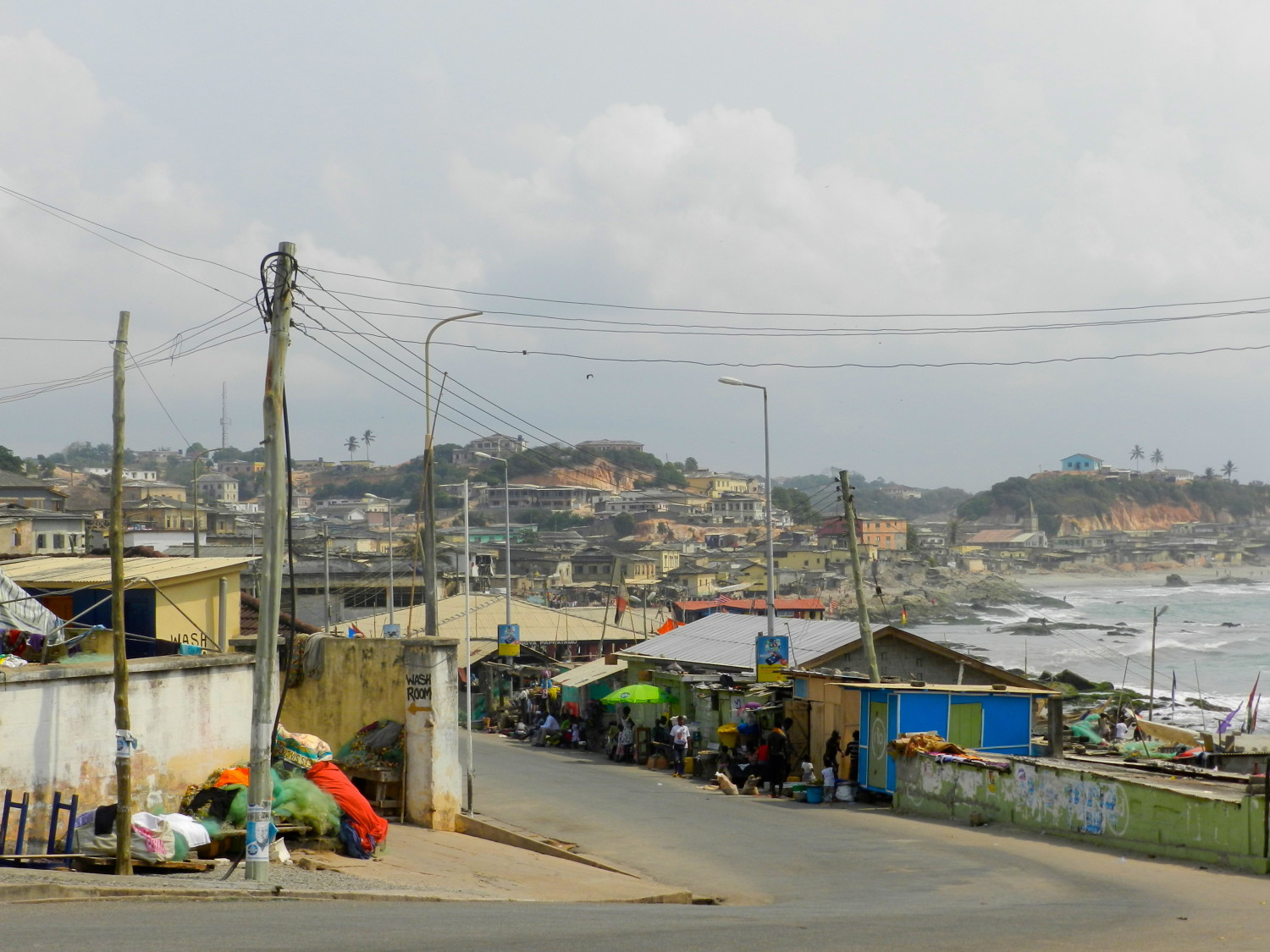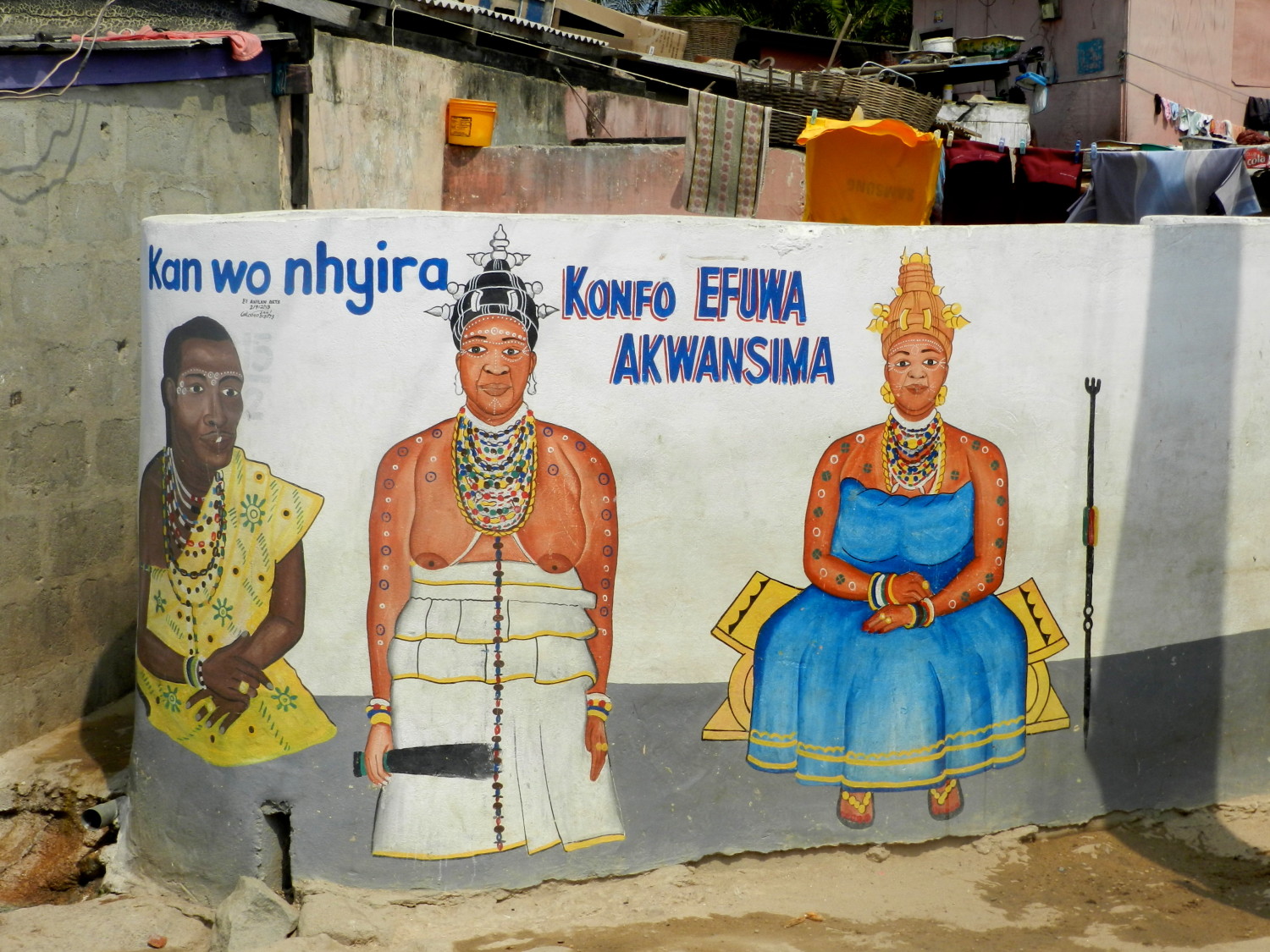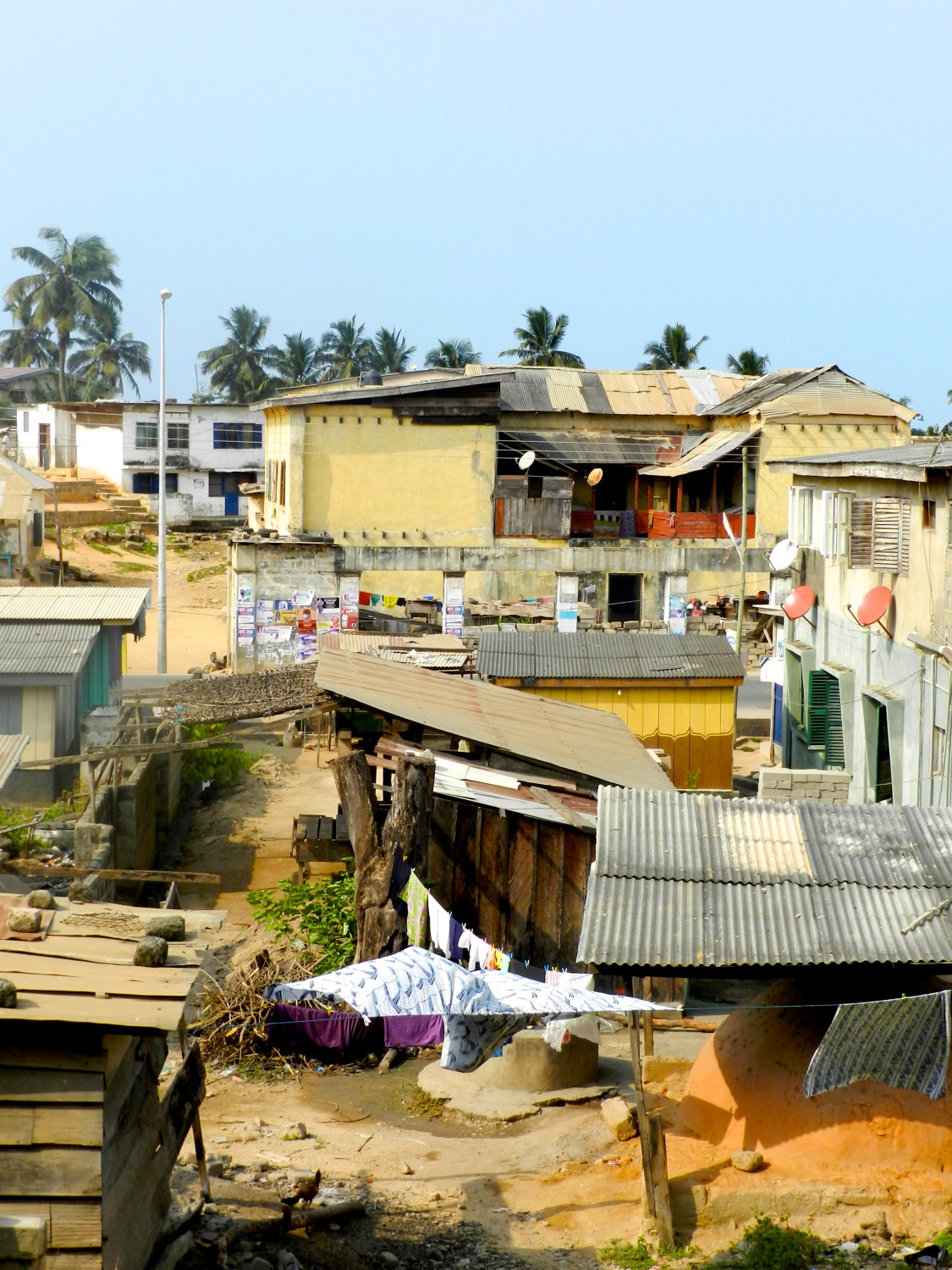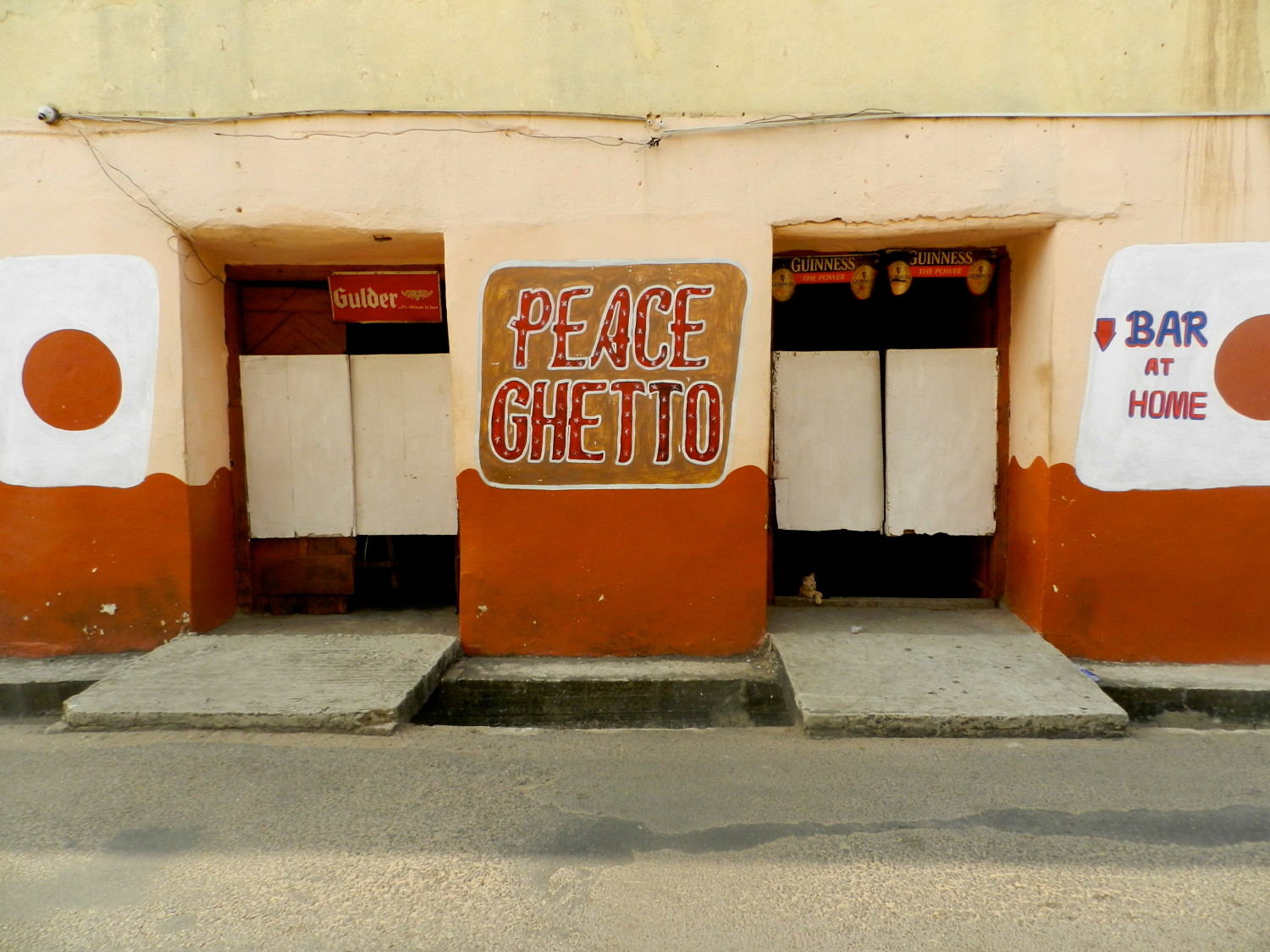Cape Coast is not making a good first impression. My nose is wrinkled and I’m trying to pick my way through the rubbish filled sand without looking too closely at what I’m walking through. In my periphery I see a grown man squatting, literally shitting on the beach. Every where I look, crusty pigs are grunting, nosing their way around the garbage. I eye them warily, not sure if they’re dangerous or just gross.
I change my view and try looking at the ocean to my right, instead. I look at the waves crashing against the rocks, look at the brown colored water with plastic floating on top.
I’m furious. I’m angry and heartbroken at what I see, though I’m not sure who to blame. The man defecating in the sand? The children picking through the pieces of left-over waste? The tourists in the distance, seemingly ignoring it all and playing volleyball? Myself?
 The view of downtown Cape Coast, Ghana
The view of downtown Cape Coast, Ghana
I’m so caught up thinking about the pollution and poverty that I barely notice a small boy handing me a piece of paper. “I want to be a doctor,” he tells me. Carrying a basket of plantain chips on his head, he speaks quietly, but with confidence. His name is John. I sign my name on the paper, with my age and country, in the spaces marked. I look him in the eyes and hand him a few cedis. This kid might be scamming me, but I choose to believe him. I choose to believe in the potential he holds, in the possibility for something better in his future.
My friend and I find a clean spot to sit down and watch a few kids horsing around. They’re doing back flips and sommersaults in the soft, cushiony sand. With a captive audience, they kick it up a notch, adding a balancing act and jumping off each other’s shoulders. I start to relax a little. In the distance I can see the old slave castle, the oldest European building outside of Europe, built in 1480-something. I look at its white walls and rusted cannonballs and think about the horrific acts that used to take place here. I think of slavery, colonialism, and exploitation.

Hints of royalty and old tradition color the streets.
Cape Coast, Ghana
Frowning, I look back at the kids. They are covered in sand, bellies exposed, shirts pulled over their heads to protect their fall. In spite of myself, a slow smile sneaks its way out of the corner of my mouth. My mood is dark and brooding, but their joy is contagious.
The next day my friend and I set out to explore the rest of the town. We avoid the garbage filled beach, but notice men and women bathing in the sewers; soap lathered bodies shining in the afternoon light. Their movements are effortless and carefree; I am the only one who feels shamed.

The view from our guest house. The polluted beach lies just beyond the palm trees.
Cape Coast, Ghana
A cool ocean breeze blows through the restaurant where we sit down for lunch, knocking strands of bamboo and seashells together, soothing my troubled mind and bringing me back to the present moment. We’re seated at a vegetarian cafe that doubles as a guest house, providing backpackers and tourists a way to support the local economy and buy fair trade goods made by students of their art workshop. I’m anxious for a real meal, something less fried, something Western and comforting for a weekend that’s been hard to swallow.

I think I’d like to have a drink inside!
Cape Coast, Ghana
The place is filled with obruni, and a handful of children are outside begging for food, being ignored. My heart melts and I take the one shyly sucking on his shirt collar to buy him and his friend a bowl of rice and a boiled egg. Later, a small girl with a heavy expression approaches us. She’s carrying a bowl full of water sachets, 10 pesewas (or about 5 cents) each. She can’t be older than 10. We shake our heads that we don’t need any water, motioning to our smoothies on the table. She asks us again with pleading eyes, telling us it’s been a hard market day. We agree, and each buy one bag. An hour or two goes by as we’re talking and scribbling notes in our journals, whiling away the afternoon. Suddenly, we see her running up to us, her face completely transformed with pure happiness. “I sold all of my water!” she says with such exuberance I think my heart might burst.
I think about all of these things on the long tro-tro ride back home. I think about the mate calling me to hop inside, patting my back as I put out my cigarette, telling me to take a few deep breaths. I think of the glowing smile of the rastafarian man and his hand dyed t-shirts proclaiming, “Africa Unite.”

The colors of Ghana’s flag.
Cape Coast, Ghana
I think about the overwhelming need, how one or two cedis is not enough to cover it or excuse it, or add a drop in the empty, gaping bucket. I think about the boy named John and hopes he will study hard and become whatever he wants to become. I think about the little girl’s face, pride pouring out of her young eyes for accomplishing her one task for the day.
I think about all of these things as I stare out the window and it starts to rain. I feel the woman sitting next to me awaken and move her head off of my shoulder as water starts dripping in from the roof. The mate quickly alerts and starts handing around a dirty towel to sop up the moisture pouring in through the window sills and pooling on the floor. Water is bubbling in as we speed past the grey skies and green trees, it’s bubbling in and getting all of us wet. Suddenly, I can feel a smile growing on my lips. I try to hold it in, but it turns into laughter and before I know it, others are laughing, too.
I don’t know what else to do. And so I laugh. I laugh until my heart feels lighter and I stop feeling so helpless. I laugh at the boys playing in the sand, doing back flips to impress a few obruni. I laugh at this crazy world and everything that seems so upside-down sometimes. I laugh because I can only help one person at a time, a few cedis at a time, a few shared laughs at a time.
Google+
No Comments